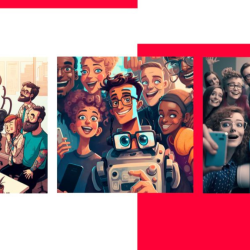The number of articles about Artificial Intelligence (AI) is increasing rapidly, along with the complexity of its capabilities
In the first three months of 2023, there were 1,738 articles mentioning AI in the UK and Irish national press, a 119% increase from the previous year. While I doubt any of these pieces were entirely written by AI, it’s clear that AI has the potential to take over aspects of news production. Newsquest, a regional newspaper group, is currently hiring an ‘AI-powered reporter’ for £22,000 a year, to create national, local, and hyperlocal content using AI. Meanwhile, the Insider website already uses AI to generate story outlines, headlines, and even some text.
Many publishers have set up task forces to explore how AI can be used and to examine its ethical implications.
AI is a double-edged sword for news publishers
They see the potential ‘efficiencies’ that it can offer, but are also concerned about losing revenue from their content being published without credit. As Angus McBride, General Counsel for News UK, cautioned, ‘a future of algorithmically generated news — in particular, opinion scraped from uncited sources — as the predominant method of delivery is dystopian.‘
AI is already adept at checking copy for grammar and spelling, editing copy to fit a certain word count, and transcribing and translating text. With some supervision, it can fact-check and even turn a set of facts into a formulaic news story. Of course, AI can’t do any of the above with flair — at least not yet. Those geniuses on newspaper backbenches who come up with great headlines and the talented sub editors who polish dull copy into something sparkling are safe… for now.
At the moment, ChatGPT’s memory cuts out in 2021. It only ‘knows’ anything (or arguably everything) that happened before that date, having been fed a diverse range of texts from the internet, including books, articles, and websites. I was impressed when I asked ChatGPT to summarise David Copperfield in three words and it told me: ‘Ambition, Betrayal, Redemption.‘ But it also thinks The Queen, Logan Roy and Pele are still alive and Boris Johnson is the Prime Minister.

A major risk is that AI can be used to generate fake news or manipulate information
We’ve already seen how it created an image of the Pope in a white puffer coat and Donald Trump being chased by the police (above). There was a new low recently when German magazine Die Aktuelle promoted what was supposedly Michael Schumacher’s first interview since his 2013 crash — only to reveal that it was an AI-generated chat.
There’s little doubt that AI poses a serious threat to news production, and may lead to further job losses in an industry that has already been through seismic shifts in the move away from print to digital.
However, when it comes to news gathering and generating exclusives, there is no substitute for a real human reporter. It cannot currently replicate the unique perspectives, creativity, and critical thinking that humans bring to journalism. AI content is inherently reductive because it can only draw from what it has learned from the past or what it’s been told. Everything it produces is a recycled or pieced-together version of something that has already existed.
Additionally, AI struggles with humour, an essentially human quality that will hopefully mean we can at least see the funny side when the robots eventually do take over.
Featured image: cottonbro studio / Pexels


































